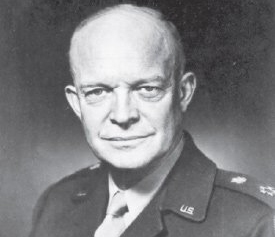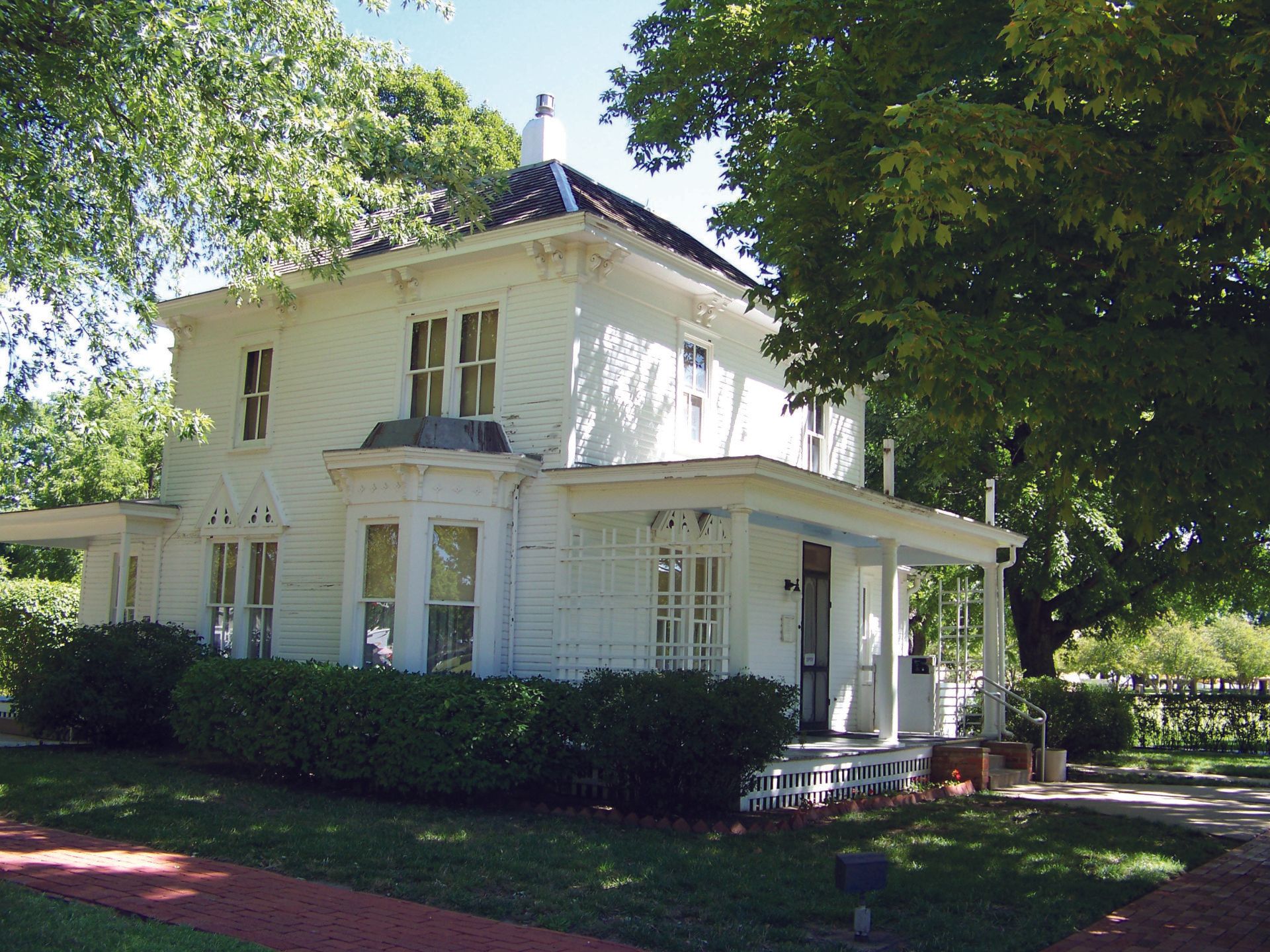The Boy From Abilene
by Diana Loski
One of the greatest American leaders should be remembered by all generations. From his humble birth on October 14, 1890 in Denison, Texas to his death at age 78 on March 28, 1969, the man known to history as Ike accomplished much in his life. Like Lincoln, whom he admired, Dwight D. Eisenhower did not appear throughout his youth to be destined for greatness. Yet, he was the man who defeated Hitler and the Nazi regime and went on to become the popular 34th President of the United States. In addition to these achievements, the man from Kansas who became an iconic world leader helped to establish programs for peace. He was a devoted advocate of that goal – and many of those programs continue today. “He knew the importance of peace ,” remembered his Gettysburg pastor, Bob MacAskill, “ because he had seen war up close.”2
To understand how Dwight D. Eisenhower reached what few achieve, it is important to take a serious look at the paths he chose, the decisions he made, the lessons he learned.
When studying the childhood of those who attained the apogee of greatness, there are many disparities. George Washington grew up without a father, and had a harridan of a mother. Lincoln was often at odds with his father, and had lost his beloved mother when he was just nine years old. Dwight D. Eisenhower endured a rather distant father, whom he loved but to whom he could not relate, but enjoyed the lifelong strength of an intelligent, cheerful mother, who encouraged him to think for himself.
Ida Stover Eisenhower was, according to her most famous son, “by far the greatest personal influence in our lives.” She had grown up practically orphaned. Born in 1862 in Virginia’s Shenandoah Valley, her father, a pacifist, had paid one thousand dollars to avoid the draft in the Confederate army. As Southern lives were continuously lost, the Confederacy drafted him again; he left his family, going into hiding. Ida’s mother grew ill from the stress of the continual harassment, and died when Ida was just five years old. As the only girl, she was parceled out, with her brothers, to relatives. She spent the next decade with cheerless grandparents. Working hard and making sure not to complain, she left Virginia for Kansas when she was seventeen, and attended college there – a rarity for a female in those days.3
David Eisenhower, a brooding young man who had recently moved from Pennsylvania with his family, noticed the studious young woman with the sunny personality. They were married in September 1885. David, whose father was wealthy, did not want to go into farming like the rest of his family. Given a substantial sum for a wedding present, David found a partner and opened a mercantile business in nearby Hope, Kansas. David was hardworking and honest, but a year of bad crops put too many of his customers in a bad way and unable to pay their bills. Additionally, David’s business partner absconded with the company funds leaving the couple penniless and in debt to the bank. David Eisenhower never fully recovered from the betrayal and its subsequent embarrassment.
Ida was expecting her third child during the filial unrest. With already two children, Arthur and Edgar, and another on the way, David was desperate for funds. Still unwilling to farm alongside his father, he took a job, albeit a menial one, in Texas. They moved to a grubby shanty-like house that stood near railroad tracks. It was there, on a stormy October night, that Ida gave birth to her third son. She named him David Dwight – years later, Ike would reverse their order.4
Dwight was the only son of the seven Eisenhower boys born in Texas. Before he was two years old, the Eisenhower family invited David back to Kansas. There was an opening in the family creamery. David accepted it reluctantly, but the move proved fortuitous for the family. The new town on the plains also proved amenable for active young boys.
Ike’s earliest memory was visiting his mother’s relatives in Topeka, when he was just four years old. His mother’s sister, Aunt Minnie, took him by himself on the train. He remembered sleeping in the heat, trusting his aunt to wake him when they reached the station. They then took a buggy ride to his uncle’s farm. “I can remember looking down through the floorboards, watching the ground rush past, ” he wrote. “When we arrived, life became even more confusing. It was peculiar to be surrounded by so many strangers…Even though they were, somehow, my family, I felt lonesome and lost among them.”5
Feeling uncomfortable, the little boy wandered outside, and came into contact with a creature that he remembered for the rest of his life. As he walked into the yard, he noticed a group of geese. More importantly, one of the geese noticed him. A large gander, seeing an intruder, rushed toward him “with hideous hissing noises so threatening that…[I] could not stand the strain.” Ike rushed back into the kitchen. Fearful of going outside after that, Ike’s timidity caught the attention of his Uncle Luther. He “decided that something must be done. He took a worn-out old broom and cut off all the straw except for a short hard knob…so that in my zeal…I might not hurt my odd adversary. With the weapon all set he took me out in the yard. He showed me how I was to swing and then announced that I was on my own.”6
It was the future commander’s first battle. When the gander came for him, Ike “let out a yell and rushed toward him, swinging the club as fast as I could. He turned and I gave him a satisfying smack right in the fanny.” The four-year-old had won his first victory, and its dividends served him throughout his life. “I quickly learned never to negotiate with an adversary except from a position of strength.”7
Dwight found himself in scrapes with his brothers and neighborhood bullies throughout his youth, but had learned from the gander how to stand his ground.
Because the Eisenhower family were not among the affluent, work was essential. David and Ida encouraged the boys to find ways to supplement their own income. There were also chores to do on the Abilene property. Ike and his brothers had to milk cows, feed chickens and build their coops, put in stalls and take care of the horses – necessary in the days before the automobile. They had to tend the sizable family garden. Inside, since Ida had no daughters, the sons had housework too. Ike learned to wash the family laundry, dust and sweep, and he became a decent cook. Sometimes he sold his signature tamales, a recipe he perfected, door to door.
Religion was sacrosanct in the Eisenhower home. Ike’s mother and father dutifully read the Bible to their sons, and sang hymns on the family piano. Ida, who spent more time with the boys than David, encouraged them to educate themselves. Her own love of reading was passed on to her third son. “My first reading love was ancient history,” Ike remembered. “At an early age, I developed an interest in the human record and I became particularly fond of Greek and Roman accounts.” His father, an avid reader of ancient scripture, was proficient in Greek, and he often expounded his discoveries upon reading in that language, which heightened Dwight’s interest. Soon, however, Ike’s fondness for study caused him to neglect his other duties, which “ annoyed ” his mother to such a degree that she resorted to locking the books in the closet. “But one day,” Ike recalled, “I found the key to that closet.” Whenever his mother went to town or was kept busy elsewhere, he reached for that key. Soon he knew ancient battles, as well as their heroes and villains, by heart. Years later, remembering those outcomes served him well.8
Dwight excelled in English and sports at school, and managed to pass adequately his other subjects. When he graduated in 1909, he spent time deciding upon advancing his education. Like his parents who encouraged him, he wanted to attend college, but he knew there was no money to finance that venture. When he learned that West Point Military Academy in faraway New York provided a free education for those willing to serve their country, he decided that particular path, like the key to his mother’s closet, was the answer.
Ida Stover Eisenhower, the ardent pacifist who remembered all too well what soldiers had done to her family, did not welcome her son’s choice. She remained silent about it, believing even more strongly in personal choice.9
Even so, when her son left that day for West Point, she waited until he was gone, and then she cried. No one hated war more than Ida Eisenhower. She had seen enough of it, and its cost, in rural Virginia.10
She could not have known that it would take a soldier who hated war as much as she did to contribute to keeping the peace. Although definitely masculine, Ike demonstrated far more of his mother’s traits than his father’s.
As the boy from Abilene, Dwight D. Eisenhower was not born to privilege and had his struggles early in his life. Yet, Abilene, Kansas proved an ideal beginning to help mold the world leader who was needed at a deadly and pivotal crossroads. He began, and continued to be, by virtue of his frontier roots, devoted to the country and the liberty America inspired. He hoped , and largely succeeded, to bring that same freedom and ideals to the entire world.

General Dwight D. Eisenhower
(Library of Congress)
Sources: Angelo, Bonnie. First Mothers . New York: HarperCollins, 2000. Eisenhower, Dwight D. At Ease: Stories I Tell to Friends . National Park Service: Eastern Acorn Press, 1998 (reprint, first published in 1967). Interview with Bob MacAskill, April 13, 1999 by the author. Jeopardy! Final Category: Famous Americans, ABC, February 3, 2022.
End Notes:
1. Jeopardy! Feb. 2, 2022.
2. Interview with Bob MacAskill, Apr. 13, 1999.
3. Eisenhower, p. 87. Angelo, p. 35. Ida had inherited some money at her father’s death and used that for her tuition.
4. Angelo, p. 92.
5. Eisenhower, p. 29.
6. Ibid.
7. Ibid.
8. Ibid., p. 39.
9. Angelo, p. 111.
10. Ibid.



